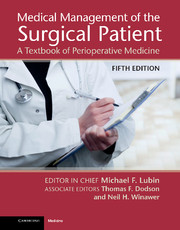Book contents
- Frontmatter
- Dedication
- Contents
- List of Contributors
- Preface
- Introduction
- Part 1 Perioperative Care of the Surgical Patient
- Part 2 Surgical Procedures and their Complications
- Section 17 General Surgery
- Section 18 Cardiothoracic Surgery
- Section 19 Vascular Surgery
- Section 20 Plastic and Reconstructive Surgery
- Section 21 Gynecologic Surgery
- Section 22 Neurologic Surgery
- Section 23 Ophthalmic Surgery
- Chapter 108 General considerations in ophthalmic surgery
- Chapter 109 Cataract surgery
- Chapter 110 Corneal transplantation
- Chapter 111 Vitreoretinal surgery
- Chapter 112 Glaucoma surgery
- Chapter 113 Refractive surgery
- Chapter 114 Strabismus surgery
- Chapter 115 Enucleation, evisceration, and exenteration
- Section 24 Orthopedic Surgery
- Section 25 Otolaryngologic Surgery
- Section 26 Urologic Surgery
- Index
- References
Chapter 113 - Refractive surgery
from Section 23 - Ophthalmic Surgery
Published online by Cambridge University Press: 05 September 2013
- Frontmatter
- Dedication
- Contents
- List of Contributors
- Preface
- Introduction
- Part 1 Perioperative Care of the Surgical Patient
- Part 2 Surgical Procedures and their Complications
- Section 17 General Surgery
- Section 18 Cardiothoracic Surgery
- Section 19 Vascular Surgery
- Section 20 Plastic and Reconstructive Surgery
- Section 21 Gynecologic Surgery
- Section 22 Neurologic Surgery
- Section 23 Ophthalmic Surgery
- Chapter 108 General considerations in ophthalmic surgery
- Chapter 109 Cataract surgery
- Chapter 110 Corneal transplantation
- Chapter 111 Vitreoretinal surgery
- Chapter 112 Glaucoma surgery
- Chapter 113 Refractive surgery
- Chapter 114 Strabismus surgery
- Chapter 115 Enucleation, evisceration, and exenteration
- Section 24 Orthopedic Surgery
- Section 25 Otolaryngologic Surgery
- Section 26 Urologic Surgery
- Index
- References
Summary
Refractive surgery is performed to reduce dependence on glasses or contact lenses. Refractive surgical techniques reshape the cornea using incisions, heat, various forms of laser, or implantation of intraocular lenses to decrease myopia (nearsightedness), astigmatism, or hyperopia (farsightedness). The excimer laser is currently the technology of choice for keratorefractive surgeons. The laser can reshape the cornea by ablating the anterior corneal surface in procedures such as photorefractive keratectomy (PRK), and more commonly in laser-assisted in situ keratomileusis (LASIK). In LASIK, the surgeon performs corneal stromal ablation using the excimer laser directed to the corneal tissue under a thin lamellar flap. This flap is created by either a microkeratome or a laser.
In order to select the best candidates for refractive surgery, a thorough preoperative history, assessment, and complete eye exam is required. Parameters such as corneal topography, central corneal thickness, degree of refractive error, ocular surface health and patient expectations are all carefully considered in order to determine whether the individual is a good refractive surgical candidate, as well as for selecting the most appropriate procedure. Absolute contraindications to laser vision correction include diagnoses of keratoconus or ectatic corneal dystrophies. Relative systemic contraindications include poorly controlled rheumatoid arthritis and diabetes, pregnancy, and AIDS.
- Type
- Chapter
- Information
- Medical Management of the Surgical PatientA Textbook of Perioperative Medicine, pp. 704 - 705Publisher: Cambridge University PressPrint publication year: 2013



